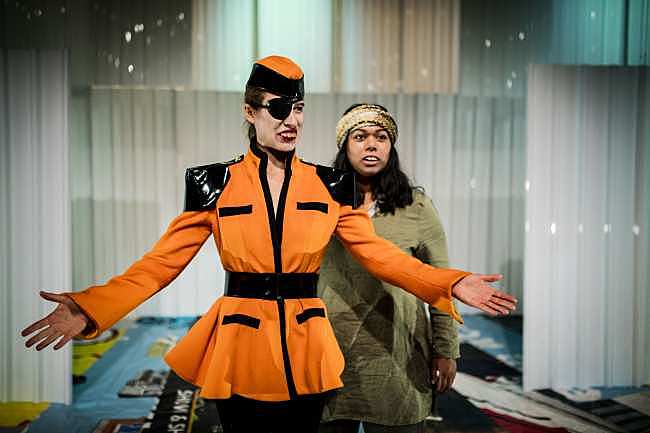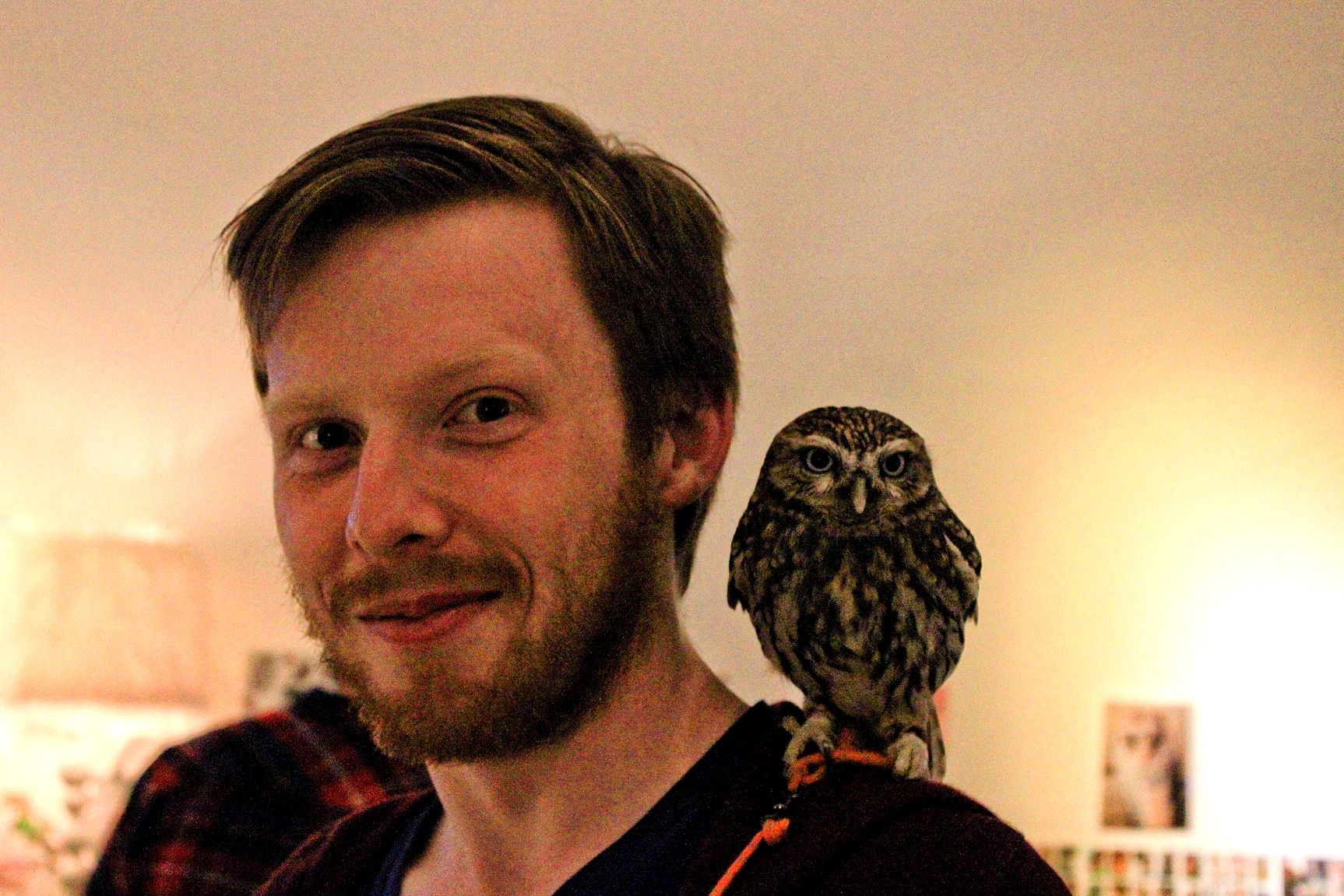Review: The Elephant Thief
Adam Goodall reviews Indian Ink's seventh play, a vivid prediction of our ruined future that's dragged down by unfocussed storytelling.
Adam Goodall reviews Indian Ink's seventh play, a vivid prediction of our ruined future that's dragged down by unfocussed storytelling.
Kali, the Hindu goddess of creation and destruction, lingers on the edges of The Elephant Thief, Indian Ink’s seventh play. She whispers to us, her voice thick with contempt, as humanity stumbles toward an extinction of its own making. Contemplate the face of your mother, she hisses as the show begins. It was the first jewel you gazed upon. It’ll be the last light you see.
Kali’s the spiritual force holding The Elephant Thief’s world together, and Leela Davi, an adventurous young woman who lives in an isolated mountain village with her father and his elephant Balthazar, wants to see that world. So, armed only with her father’s fifty year old map for guidance, she sets out to explore the rest of India and, hopefully, beyond. It’s not been 2016 for a while, though: Paris is now underwater, European refugees are spilling into South Asia and everyone wants that elephant. In the interim, they curse Kali for letting everything fall apart, and Kali fires right back, mocking them - and us - for their active role in bringing all this to pass. Are there any doctors in tonight? Don’t you get tired of it? People only coming to you when they’re sick?
Writers Jacob Rajan and Justin Lewis (the latter pulling double duty as director) present a vision of 2066 as ruined by capitalism and human hubris, a confrontational portrait of our Earth polluted in both body and soul. That vision starts with the set, a grim and beautiful design by Stephen Bain and Sarah-Jane Blake. Corrugated iron panels hang from the roof, yellowed with age, temporary patches barely holding things together. Below these panels, a grimy collage of signage and packaging fans out across the floor, a tarnished relic of our rapacious and commercial present. Kali whispers from this rubble, calling both characters and audience to reckon with what we’ve created.
This reckoning escalates over two hours, opening with scenes of mundane grassroots corruption before building a broader, more detailed image of social dysfunction: collapsing borders, environmental catastrophe, institutional inhumanity. It’s not an especially steady escalation - the script has a bad habit of stopping dead to dump world-building on us, like in an early encounter between Leela and two Red Cross workers - but it comprehensively connects this societal destruction to the now, making our personal answers to the show’s questions more urgent and all-encompassing.
Rajan and Lewis have devised an astonishing off-kilter dystopia, so it’s frustrating that the story they choose to tell within it is so wildly uneven, playing like two different stories entirely. The first half is a meandering road comedy, part-Wim Wenders and part-Muppets, following Leela as she breaks out of jail and drifts into a series of encounters with cartoonish civilians. Each of these caricatures is a remnant of a long-dead civil society, an individual clumsily trying to fit this new dystopia into the framework of their old life. The first half is at its funniest and most cutting when it’s mining the comedy in that: the Red Cross workers who’ve taken up organ trading; the heir to the French throne who attempts to enlist Leela as a “loyal subject”; the buffoonish jailer trying to marry off her psychotic son.
The actors tackle these caricatures with breakneck energy, grotesque dentures and costumes that grossly exaggerate each character’s proportions. As a jailer whose corruption is matched only by her incompetence, Nisha Madhan throws herself around with boundless pomposity; she’s just as fun to watch as a benevolent but imperious Rani de Bourbon, a French royal half a world away from the throne she desperately craves.
Given less to work with, Jonathan Price and Patrick Carroll find laughs by stretching their characters’ tics out to breaking point. Price lays it on thick as Red Cross worker Frank, a classic Aussie bloke who stretches his haunches like he’s auditioning to play Steve Irwin. As sociopathic government stooge Benito, Carroll gets incredible mileage out of some mountainous shoulders and a melodramatic Italian accent, undermining Benito’s arrogance with every ridiculous shimmy and hammy threat.
As Irina Sharma, the Russian-Indian detective hunting Leela through the Indian rainforest, Julia Croft experiments with shades of sharpness and warmth, foregrounding and backgrounding Irina’s complexities long before the script chooses to reveal them. Vanessa Kumar also adds some interesting wrinkles to an otherwise clearly-defined character, playing Leela as an earnest trickster who can’t help but stumble her way through every con.
Rajan and Lewis take on a significant, bracing challenge, exploring difficult questions about how we reckon with man-made catastrophes in an ethical way, if it’s even possible to do so, and whether humanity deserves saving from an extinction of its own creation.
Even with all this vibrancy and energy, the first half drifts along without any sense of there being much at stake. We start out on the back foot, with Rajan and Lewis dedicating a good chunk of the first scene to explaining how Leela’s ended up in prison, and there are regular pauses to bring us up to speed with the plot, the characters and their motivations. Some of these scheduled updates are striking in their own right - at one point, Carroll repurposes the clay-masked character from his Fringe Festival show Layman for a nightmare sequence, abstracting Leela’s past into a series of destructive, disorienting images - but Rajan and Lewis too often communicate key information through characters sitting down for a lengthy chat.
This means that scenes start slow, take an age to find their rhythm and end up introducing tension as an afterthought, something to do after you’ve got all the story out of the way. That rhythm, too, is elusive - not just because there’s no real drive to this half, but because every other joke is punctuated with a knowing look to the audience. All of the actors have to mug through the fourth wall to sell jokes and while some are better at it than others, none of them are able to make it a natural part of the action. Leela’s jailbreak takes forever because of this hammy directorial choice, starting and stopping under the weight of lame-duck Snapchat jokes and the forced suggestion we should laugh.
The second half lurches into top gear, transforming into a high-stakes thriller involving the Indian government, a space program and Balthazar (a huge and impressive puppet brought to graceful life by Price). With that shift, Rajan and Lewis take on a significant, bracing challenge, exploring difficult questions about how we reckon with man-made catastrophes in an ethical way, if it’s even possible to do so, and whether humanity deserves saving from an extinction of its own creation. Leela, Irina and Prime Minister Sonia Ambhardi (Madhan, funny as hell in the show’s most grounded performance) all pursue their goals in ways that we’d traditionally read as heroic or evil, but we’re constantly provoked to consider them through the lens of social and environmental disaster. It’s an audacious approach; given the space to truly explore the angles to everyone’s actions and interrogate the consequences of those actions, it’s an approach that could have implicated and challenged audiences in an uncommonly intelligent and forthright way.
That space goes wanting. Characters make decisions with barely any hesitation and we’re shuttled from scene to scene, action to action, without time to process whatever’s just happened. Leela swings between heroism and selfishness like a pendulum and other characters don’t fare much better, hitting only the most fundamental beats and doing so without any shade or complexity. The central dilemma of whether it’s ethical or right to send Leela and Balthazar alone into space isn’t so much explored as it is battered with arguments that never get below the surface, and the dialogue - “I need to say goodbye”, “Be the result of your past or the cause of your future”, “Glory and failure are potent legacies” - constantly pushes subtext to the front because there’s no time left for subtext.
Where the first half of The Elephant Thief lacks momentum, the second half has an excess of it. Things happen because they happen, and we’re given no time to really consider anyone’s motivations because everyone’s rushing to hit their marks, suddenly changing, changing, changing after an hour of stasis and exposition. This undercuts those challenging questions Rajan and Lewis are trying to explore because we can’t get anything more than a superficial read on how the characters themselves grapple with those questions. How can we consider all the angles when we’re not even given time to react to them?
At its core, The Elephant Thief is a parable told with urgency and conviction. It vividly sketches the consequences of our waste and greed and it calls on us to be the hope of our world by making the sacrifices necessary to save it. But it’s hard to ignore how Rajan and Lewis gesture time and again toward more complex questions and messy realities than a parable can hold, and it’s harder still to ignore how those gestures are constantly undermined: by a shambling first half, an overstuffed second half, and clumsy storytelling that not even these actors can paint over.
The Elephant Thief runs at
Hannah Playhouse, Wellington
from Wednesday 18 May - Saturday 4 June
TSB Showplace, New Plymouth
from Thursday 9 - Saturday 11 June
Q Theatre, Auckland
from Wednesday 15 June - Saturday 2 July
For tickets and more information, go here.

